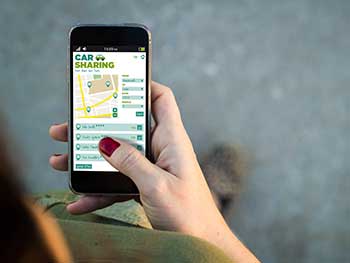
Popular ridesharing companies, including Uber and Lyft, differ from traditional taxi companies considerably. Because of these differences, the issue of liability in the event of an accident is controversial and confusing.
About Ridesharing
Ridesharing companies allow consumers to hail vehicles directly from their smartphones. A nearby driver accepts the job, and the consumer is able to travel to his or her destination for a set price. Money changes hands electronically, allowing for a quick and efficient transaction. In many cases, this service is faster and more affordable for consumers than a traditional taxi. However, these companies don’t have the same requirements with regard to liability insurance, which poses a risk to Uber passengers, as well as to the drivers and passengers of other vehicles on the road.
The Potential for Liability
Most Uber passengers make it to their destinations safely. Unfortunately, in some cases, Uber or Lyft drivers are involved in automobile accidents that lead to serious injuries and/or property damage. When this occurs, the issue of liability always surfaces. Although these services cover their drivers with sizeable insurance policies, these policies won’t always be able to provide adequate compensation to injured parties after an accident. If this occurs, injured passengers or drivers may be left to cover medical bills, lost wages and other burdensome expenses without assistance from the party responsible for the accident.
Regulations
According to the Baltimore Sun, the governor of the state of Maryland signed a bill regulating the operations of ridesharing companies within the state. Under this law, these companies will be able to operate with fewer restrictions than traditional taxi companies. However, the law does require ridesharing companies to carry a minimum amount of liability insurance in order to operate in Maryland. Specifically, Uber drivers are required to purchase at least $50,000 to $100,000 in liability insurance before they can begin accepting fares. Uber also provides its drivers with $1 million in liability coverage and an additional $1 million in uninsured motorist coverage. However, these large policies apply only when the driver is on duty with passengers in the vehicle.
Gaps Still Exist
Even with Maryland’s insurance requirements in place and Uber’s additional coverage, liability disputes may still occur. For example, because the amount of coverage Uber will provide is limited to $1 million, victims who require higher amounts of compensation won’t be able to easily obtain the money they deserve. In addition, because Uber’s $1 million policies are active only when a driver is on duty and actively transporting a passenger, they won’t apply in cases where an Uber driver causes an accident in between fares. In such cases, Uber’s coverage drops to $50,000 worth of bodily harm coverage per person and $25,000 of property damage coverage.
Keep in mind that certain Uber vehicles, including UberSUV and UberBLACK, are considered commercial vehicles and, therefore, are subject to different liability insurance requirements.
What to Do after an Uber Accident
If you have been injured in an accident involving an Uber driver, you may be able to recover compensation for your medical bills, lost wages, property damage and more by taking the appropriate action. However, because of the complexities of Uber insurance policies, consulting an attorney is highly recommended. An attorney who has experience in this field will be able to help you decide how to approach the case.
After a vehicle accident, whether with a Uber or Lyft rideshare or with a gigantic tractor-trailer barreling down the interstate, call Steven Heisler, The Injury Lawyer, to make sure your interests are protected. The consultation is free and there is no further obligation. Call 1-877-228-HURT (1-877-228-4878) or use our online contact form.
